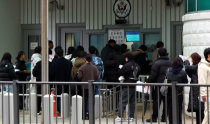[Editorial] Medical strikes are going too far
[Editorial] Medical strikes are going too far
Posted September. 29, 2000 20:59,
After many twists and turns, the government and the striking doctors came to the negotiating table. Regretfully, however, the negotiations seem to be going nowhere due to the doctors' unreasonable stand of raising issues not essential to the dispute.
For example, the doctors demanded at first that the policeman in charge appear before them to render apologies for the police's violence last month against the striking resident doctors. They then came out with a new demand as a prerequisite for the continuation of negotiations that the government take disciplinary measures against the officials in charge of implementing the new system to separate professional roles between doctors and pharmacists.
Such demands may be part of their tactics to have initiatives in the negotiations, but they cannot avoid the criticism that they are carrying it too far. What the resident doctors demand does not represent the core of the issues in dispute, be it the responsible police official's personal appearance before them to offer apologies or the punishment of the officials in charge of the new medical practice.
The essential issue in the negotiations between the government and the striking doctors is how to remedy the wrong medical and health delivery systems that have come to surface during the course of conflicts to separate the professional roles of doctors from pharmacists.
President Kim Dae-Jung and the minister in charge of health affairs have already expressed regrets over the rather shallow and hasty judgment on the implementation of the new system so as to incur the present medical crisis. The current medical crisis is largely attributable to the administration's lack of adequate preparations for fundamental medical reforms.
It hastily pushed ahead with the new medical practice solely on the ground of the merits and causes that call for the new system.
It behooves both the government and the striking doctors to make all-out efforts, and to address the dispute's essential issues for the genuine, negotiated settlement of the current medical standoff at the earliest possible time. The doctors' unilateral demands appear hardly reasonable but give the impression that they are only interested in the government's total surrender to them.
The medical community has always insisted on medical reforms for the people. It has also argued for the separation of medical roles between physicians and pharmacists in the larger context of overall medical reforms. This is the right stand to take, but we have some serious reservations about their professed concern for the people in view of their protracted four-month strikes, for which they can in no way win people's support. The physicians must know that many people who supported their demands are now turning against them. This is because they are making unreasonable demands unrelated to medical reforms as prior conditions for negotiations. The demands are as absurd as to have the effect of putting our legislative, judicial and administrative powers into jeopardy.
The medical community should now make concentrated efforts for a genuine medical reform for the people. Our urgent agenda here is to resolve mutually contradictory aspects of medical reforms to satisfy on the one hand the priority of best health care for the people and, on the other, the minimization of their medical expenses. The difficult resolution will dictate the efforts of all the parties, the government, the people, physicians and chemists, to display the spirit of conceding one's stand for others as well as agreeing to alternative terms for settlement in the absence of the best.
The deadlocked medical strikes have incurred enormous social losses and sacrifices which include people's undue suffering and inconvenience as well as many general hospitals' bankruptcy crisis. Resident doctors should now stop their strike. The medical community is urged to demonstrate its broader and flexible stance for a negotiated settlement for its cause.






![노동신문 개방? 노동신문 서버는 개방을 견뎌낼까?[주성하의 ‘北토크’]](https://dimg.donga.com/c/138/175/90/1/wps/NEWS/IMAGE/2025/12/26/133032325.1.jpg)
